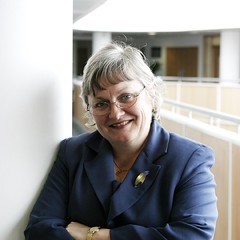Please see my new Blog at:
http://suemcknight.wordpress.com/
All previous postings have been moved.
This site is now closed.
Sue
Monday, 18 June 2007
Monday, 27 November 2006
I remember when... the next debate
http://blogs.zdnet.com/BTL/?p=4004
This link is to an interesting discussion, comparing (or not) Web 2.0 with Darth Vader.
What strikes me is that the conversations are not new; merely about new technological developments. I am old enough to remember the world pre-Internet, and the hype that it was regarded in the beginning. I recall that the president of IBM predicted that there would only ever be about six computers required in the world.
Penny Carnaby, Director-General of the National Library of New Zealand, and a former University Librarian, wrote a challenging paper for the 2006 IFLA Conference on Networking Cultural Heritage. The link is below:
http://www.ifla.org/IV/ifla71/papers/146e-Baba.pdf
In the question time after her presentation, she remarked that ordinary members of the community have a valid right to create 'cultural heritage', via blogs and wikis and the like, and charged librarians to think of the value of information in a much broader context than we do now.
As I type, I recall the medieval monastry libraries with the chained books, which didn't admit women who were not proper scholars. The debate about Web 2.0 is somewhat analogous, don't you think?
This link is to an interesting discussion, comparing (or not) Web 2.0 with Darth Vader.
What strikes me is that the conversations are not new; merely about new technological developments. I am old enough to remember the world pre-Internet, and the hype that it was regarded in the beginning. I recall that the president of IBM predicted that there would only ever be about six computers required in the world.
Penny Carnaby, Director-General of the National Library of New Zealand, and a former University Librarian, wrote a challenging paper for the 2006 IFLA Conference on Networking Cultural Heritage. The link is below:
http://www.ifla.org/IV/ifla71/papers/146e-Baba.pdf
In the question time after her presentation, she remarked that ordinary members of the community have a valid right to create 'cultural heritage', via blogs and wikis and the like, and charged librarians to think of the value of information in a much broader context than we do now.
As I type, I recall the medieval monastry libraries with the chained books, which didn't admit women who were not proper scholars. The debate about Web 2.0 is somewhat analogous, don't you think?
Thursday, 23 November 2006
Information Literacy Support via a Blog
An interesting use of blogs, for librarians, is at http://bathsciencenews.blogspot.com/, which is an information literacy site for science students at Bath University. I would be very pleased to be informed of other such uses of blogs to assist in providing advice on information literacy.
Wednesday, 22 November 2006
Trust in Information
The American Society for Information Science and Technology's Special Interest Group for International Information Issues (SIG-III) has introduced a blog at:
http://www.neasist.org/icisc/blog/
It is seeking to explore 'what is trust in information'.
Interesting debate.
http://www.neasist.org/icisc/blog/
It is seeking to explore 'what is trust in information'.
Interesting debate.
Monday, 20 November 2006
Promoting NTU Blogs
I have just drafted my monthly article for the internal Libraries and Learning Resources newsletter, LLR Link, and it focuses on Web 2.0 and the technologies that facilitate Web 2.0, of which the blog is one of many.
Web 2.0 is an attitude, not a technology. Web 2.0 (the attitude), to be effective, requires a culture of openness and sharing. The enabling technologies (blogs, wikis, MySpace, YouTube etc) have been successful because of the culture of trust and accountability that is fostered when non-compliance means involuntary exclusion. We need to learn and determine how we can work with these technologies as restricting or limiting their use is no longer an option.
How might we use the information posted by our community to help us learn? It really is a new paradigm.
Web 2.0 is an attitude, not a technology. Web 2.0 (the attitude), to be effective, requires a culture of openness and sharing. The enabling technologies (blogs, wikis, MySpace, YouTube etc) have been successful because of the culture of trust and accountability that is fostered when non-compliance means involuntary exclusion. We need to learn and determine how we can work with these technologies as restricting or limiting their use is no longer an option.
How might we use the information posted by our community to help us learn? It really is a new paradigm.
Friday, 17 November 2006
How do people use blogs?
This is my first experience with Blogs, and I am curious to see how I can use the communication technology to help improve our library and eLearning services. I work in a university environment where we have to mange some aspects of learning and provide quality assured information resources; but we also have to empower learners to learn from peers and others, and we from them; and then there is the concept of 'a free for all'. Any asvice on how to structure questions to elicit good feeback would be very gratefully received.
Subscribe to:
Comments (Atom)
